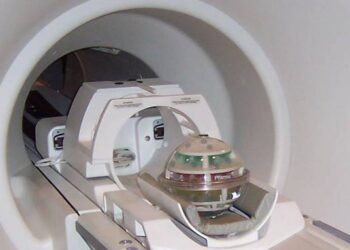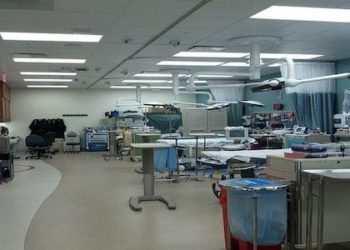Computer-aided detection may improve detection of polyps and adenomas compared with conventional colonoscopy
1. In this updated systematic review and meta-analysis, computer-aided detection found more polyps and adenomas per colonoscopy compared with standard detection methods.
2. While the average number of advanced colorectal neoplasms per colonoscopy was similar between the two groups, advanced lesions were detected at a slightly higher rate when using computer-aided detection.
Evidence Level: 1 (Excellent)
Study Rundown: Convolutional neural network approaches for computer-aided detection (CADe) have been shown in numerous randomized trials to be more successful in detecting polyps compared to traditional colonoscopy. However, CADe performance in identifying concerning lesions such as advanced adenomas and sessile serrated lesions has been inconsistent across studies. This systematic review and meta-analysis examined results from 44 randomized controlled trials (RCTs) to determine the efficacy of CADe in diagnosing clinically relevant colonic lesions. Compared with standard colonoscopies, CADe found more polyps per colonoscopy (PPCs) and adenomas per colonoscopy (APCs) on average and had a significantly higher polyp detection rate (PDR) and adenoma detection rate (ADR). Adenoma miss rates (AMRs) were also lower for CADe. However, the certainty of evidence for overall APCs and ADRs was rated low due to serious risk of bias and inconsistency among studies. With regard to advanced colorectal neoplasias (ACNs), CADe detected a similar number per colonoscopy as compared with standard methods but had a slightly higher overall ACN detection rate. In general, CADe also appeared to minimally extend withdrawal time, but the evidence for this finding was deemed low-certainty. This study was limited by the heterogeneity of the extracted RCTs, a lack of blinding, and an inability to account for confounding factors. Nevertheless, this updated meta-analysis provided a more comprehensive perspective on the effectiveness of CADe in polyp detection during colonoscopy.
Click to view this study in AIM
Relevant Reading: Real-Time Computer-Aided Detection of Colorectal Neoplasia During Colonoscopy: A Systematic Review and Meta-analysis
In-Depth [systematic review and meta-analysis]: This systematic review and meta-analysis investigated the efficacy and safety of CADe in detecting polyps, adenomas, and other clinically important lesions, especially ACNs. Only RCTs that compared lesion detection in standard colonoscopies and CADe-assisted colonoscopies were included. Primary outcomes included average PPC, average APC, average PCN, and average NNP per colonoscopy; secondary outcomes were total PDR, total ADR, ACN detection rate, and AMR. Balancing outcomes included adverse effects relating to procedures, number of NNPs resected and the proportion of resected polyps that were NNPs, total withdrawal time, and inspection time during withdrawal. A total of 44 RCTs were ultimately included in this study, 41 of which were found in databases and 3 through reference chasing. Findings from 39 RCTs showed that CADe yielded a higher average PPC (1.59 vs. 1.27, incidence rate difference [IRD] = 0.35 [95% CI, 0.26 to 0.43]) and higher average APC (0.98 vs. 0.78, IRD = 0.22 [95% CI, 0.16 to 0.28]) compared with standard methods. CADe also had a higher PDR (54.01% vs. 46.53%; rate ratio [RR] = 1.21 [95% CI, 1.14 to 1.27]) and ADR (44.67% vs. 36.74%; RR = 1.21 [95% CI, 1.15 to 1.28]). The certainty of evidence for APC was rated low due to serious risk of bias and serious inconsistency; the certainty of evidence for ADR was rated very low due to serious risk of bias, serious inconsistency, and publication bias. Studies with baseline low detection rates showed greater improvement with CADe (27% vs. 20%, RR = 1.39 [95% CI, 1.18 to 1.63]). Both groups had similar ACN per colonoscopy, but CADe had a higher ACN detection rate (12.7% vs. 11.5%, RR = 1.16 [95% CI, 1.02 to 1.32]). CADe led to resection of approximately 0.2 more neoplastic polyps per colonoscopy (1.05 vs. 0.84, IRD = 0.22 [95% CI, 0.15 to 0.28]), but also of 0.2 more non-neoplastic polyps per colonoscopy (0.53 vs. 0.33, IRD = 0.18 [95% CI, 0.10 to 0.25]). Findings from 30,276 procedures showed that CADe increased withdrawal time in minutes (10.33 vs. 9.68, mean difference (MD) = 0.53 [95% CI, 0.30 to 0.77]) and inspection time in minutes (8.34 vs. 7.95, MD = 0.31 [95% CI, 0.14 to 0.48]). Overall, this study provided an updated view of the efficacy and safety of CADe in diagnosing colonic lesions.
Image: PD
©2024 2 Minute Medicine, Inc. All rights reserved. No works may be reproduced without expressed written consent from 2 Minute Medicine, Inc. Inquire about licensing here. No article should be construed as medical advice and is not intended as such by the authors or by 2 Minute Medicine, Inc.




![2MM: AI Roundup- AI Cancer Test, Smarter Hospitals, Faster Drug Discovery, and Mental Health Tech [May 2nd, 2025]](https://www.2minutemedicine.com/wp-content/uploads/2025/05/Untitled-design-350x250.png)




